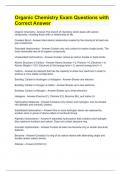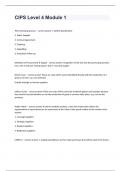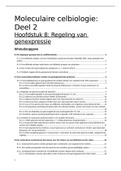Summary lectures 1 – 7
,Lecture 1 - Introduction + The Mind-Body problem 1
What the course is about
Neuroscientific research and new neuro -technologies give rise to new social, legal, and
ethical issues:
• Cognitive, affective, and bodily enhancement through technological devices
o Google maps (cognitive enhancement)
o Digital lenses (bodily enhancement)
• Development of artificial systems that are intelligent and potentially conscious
o If AI systems are seen to have consciousness, they can be subject to ethical rights
• Prediction of human behavior or the course of a disease based on machine-learning
o Machine learning is used in medicine, e.g. whether an organ transplant can be taken place
• Use of algorithms in social media and the creation of epistemic bubbles
• Use of neuroscientific data in psychiatric contexts
Why do we need philosophy?
The aim of philosophy is analysis and conceptual clarification
Philosophy can help to disclose background assumptions, unravel central concepts, highlight the potential
or misunderstanding, and outline the implications of certain positions.
Philosophy of Mind
The relation between the mind, on the one hand, and the physical brain, body, and environment, on the
other
Mind-Body Problem 1
We have a mind. We have a body. The mind seems to have characteristics that the body does not have, and
vice versa.
• How is it possible that our mind exists as part of the natural world?
• How can we explain the mind as a natural phenomenon?
Typical question:
• Is the mind identical to the brain, or are they separated?
There are 3 different ideas to the mind-body problem :
1. Substance dualism (religious background, mostly disliked by scientists)
• Descartes came up with this theory in 17th century,
• Mind and body share different properties, and therefore they are not identical, and thus distinct.
According to Descartes:
o Humans consist of 2 parts and coexist independently: General rule:
▪ An immaterial mind (soul) and Two things are identical if all of
▪ A material body (matter) their properties match (e.g. spatial
• Mind/soul Brain/Body location, texture, color, etc.)
o Angels/god are pure mind and no matter
o Animals/tables are pure matter, no mind
,Problems:
• Spatial location/extension claim
o According to substance dualism:
▪ Bodily states and processes have a spatial location and extension
• Each organ has its own place in the body
• You can say: the heart is right from the liver
▪ Mental states and processes have no special location
• You cannot say, my memory of chocolate is left from my memory of
strawberries.
o Counterexample:
▪ Do mind and body really have different properties? – localism (identity theory)
• With present day knowledge, we can say that the auditory field in the brain
is in front of the visual field in the brain.
• Therefore both the “mind” and the brain both have spatial location
properties.
• Rationality claim
o According to substance dualism:
▪ Mental entities are rational entities. It is excluded that material entities are rational
or have rational abilities.
• A human can make rational decisions, but a table (pure matter) cannot.
• Intentionality claim
o According to substance dualism:
▪ Mental states can be about something. They can refer to extra-mental entities. e.g.
I believe that Paris is the capital of France.
• A stone or a table cannot have a mental state
o Counterexamples (also for the rationality claim):
▪ Artificial intelligence might be rational
• You can program a machine that is able to infer things
▪ A robot can have a belief about something (Siri, Wikipedia)
• A robot can have the belief that Paris is the capitol of France
• Phenomenon quality claim
o According to substance dualism:
▪ Mental states can have a subjective experiential quality. They are characterized by
a certain phenomenal character (e.g. pain).
o To define something as conscious is still really hard, so there are no explicit
counterexample to this claim (the same problem holds for the other two ideas)
2. Behaviorism
Psychological behaviorism is the science of behaviour, and the central task is explain behaviour in stimulus
response reactions. You only look at aspects that are observable in third person perspective (no
introspection). So with behaviourism, you only look at stimulus and behaviour: theories like classical and
operant conditioning (measurable activities).
Operant conditioning Classical conditioning
Skinner box Pavlov
- Positive reinforcement Ringing a bell
Food with lather whenever there is
- Negative reinforcement food provided.
Loud noise reduction Saliva is produced
- Positive punishment whenever a bell is
Electric shock rang.
- Negative punishment
Food withdrawal
, Introspection
How can we investigate the mind when it is different to matter -> introspection
Only you can say that you are in pain, not someone else, therefore introspection reports can never be
verified or falsified by others.
Psychology should not rely on introspection
Problems with psychological behaviorism:
• In everyday life, we ascribe mental states to others and ourselves. Mental states are states that
describe a motive, a feeling about something or a belief (any kind of state a brain/mind can be in).
o These mental states are part of introspection theories. So however we use them all the
time every day, since these mental states cannot be measured, with the idea of
psychological behaviourism, these mental states are accepted, but ignored.
▪ This idea causes that our psychological understanding is incomplete, since there
are an abundance of “black holes”, that cannot be measured (since mental states
are ignored).
▪ The response-stimuli paradigm does not work for complex interactions
Philosophical behaviorism
• Mind is not a thing, but referred to as behavioural dispositions. Dispositions are the tendency to
display specific behaviour in circumstances.
o If you place sugar in contact with water it will solve (solvency)
Problems:
• Mentalistic vocabulary is not fully analysable or translatable into behavioral statements (e.g. pain).
o "super stoic”: mental states without the corresponding behavioural expression
o “perfect pretender”: behavioural expression without the corresponding mental states
➔ Reply: These cases are not real (there is no person who acts exactly like someone who is in pain).
• Mental holism: Mental states do not occur in isolation but are part of more complex networks of
mental states. Behavior is not connected to one but multiple interrelated mental states.
3. Identity theory
Mental states are identical to brain states (so mental states are real)
but here mind is not an independent substance, but it is identical to the brain.
But, the mind is not identical to the brain!
Sensory input -> brain processes/mental process -> output
A more neuroscientific way of looking at the mind and brain.
Phineas Gage (got an iron rod went through his skull).
He not only survived, but could still read, eat, sleep, speak, etc. he only could not have emotional capacities
anymore since the rod went through a part of the brain that regulates this.







